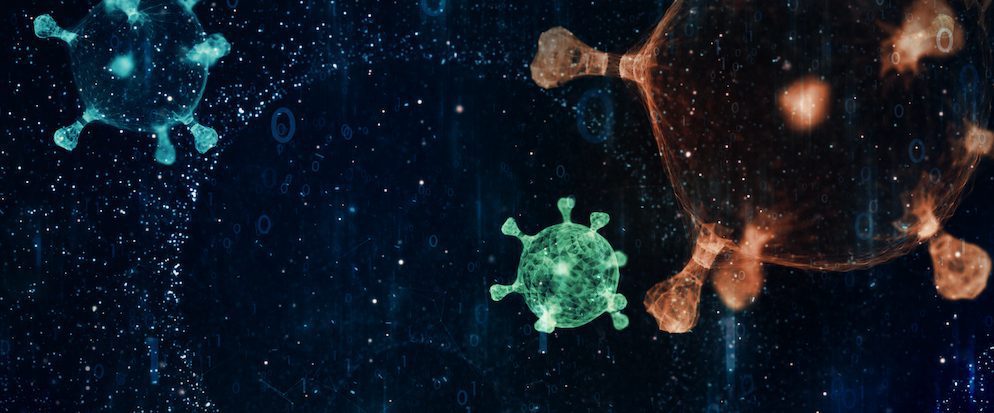As the number of people tested positive for coronavirus has surpassed 2.3 million, Israeli innovators are harnessing artificial intelligence technologies to curb the global pandemic, perhaps the most challenging public health crisis in modern history.
What we know already is that scientists and researchers are working diligently to find treatments and to develop a vaccine for coronavirus. Meanwhile, artificial intelligence technologies are emerging as key solutions to combatting coronavirus, and Israel is well positioned in this field.
Israel is well known for its strength in deep-tech, and is also home to a vibrant AI ecosystem that has been growing rapidly over the past few years. Israel’s unique tech ecosystem includes companies and startups that utilize AI technologies in healthcare, cybersecurity, autonomous driving, and many other fields.
Some of these life-saving technologies are already helping the Israeli healthcare system slow the spread of the virus. Many are also being shared for use by countries around the globe, including those hardest hit by COVID-19.
One example is an AI-based triage platform that gives public health officials continuous monitoring of the patterns in which the virus spreads. Originally developed by Israeli company Diagnostic Robotics and adapted to tackle the current pandemic, the platform also offers an analytics tool that produces risk assessment and predictive models, thereby allowing a faster and better targeted medical response.
Officials from the US, Italy and other countries turn to Israeli innovators for help
Founded in 2017 by Dr. Kira Radinsky, Prof. Moshe Shoham and Yonatan Amir, Diagnostic Robotics has so far raised $24 million from investors. The startup recently joined the global fight against COVID-19 by giving countries access to their technology at cost. Governments in the US, Italy, Brazil, Austria, and the Netherlands have recently expressed interest in the system.
“We wish to contribute to any country’s efforts and help in any way we can during these challenging times,” said Dr. Radinsky, a world-renowned expert in AI, whose work predicted the cholera outbreak in Cuba a few years ago. “We want to share our technology platform and the knowledge we’ve gained from the nationwide coronavirus monitoring system deployed in Israel.”
Artificial intelligence technologies minimize direct contact with medical teams
The Israeli Ministry of Health recently launched a nationwide scheme that does daily monitoring of coronavirus-related symptoms of the population by using Diagnostic Robotics’ digital risk assessment and monitoring platform for COVID-19. The platform, which analyzes the patient’s clinical symptoms and underlying health status, generates a personalized, AI-based risk profile for COVID-19, in addition to providing next-step guidance.
The information is delivered as “red flags” to health authorities, creating a “heat map” of corona hot spots, which in turn helps medical services identify which regions need intensive care.
The Diagnostic Robotics solution leverages data provided by the public remotely, helping individuals determine the right course of action while minimizing direct contact with medical teams – which also eases the burden on healthcare staff.
How does this work? Healthcare providers engage their clients with a simple symptoms questionnaire via a text message. This remote screening process, illustrated by a high-resolution epidemiologic heat map, enables health officials to gain a continuous, real-time, and large-scale assessment of the virus’ spreading rate. By referring to such a heat map, decision makers can know immediately which geographic areas warrant immediate attention.
Helping hospitals and labs detect, diagnose and monitor
Diagnostic Robotics is not the only Israeli startup* harnessing artificial intelligence to take on COVID-19. Diagnostics.ai is currently providing laboratories in the US and UK with its advanced diagnostic tool, which employs artificial intelligence for faster and more accurate test results. Diagnostics.ai’s technology streamlines the process of detecting, diagnosing, and tracking infectious diseases by automating the DNA analysis step.
This accelerates the diagnostic process, removes the need for specially trained technicians, and eliminates the error factor in interpreting results. The company’s built-in tracking capabilities allow hospitals, governments and patients to track coronavirus incidences by area with standardized, accurate test results.
Analyzing test results nowadays requires skilled technicians and a lot of precious time, as much as a few days. But in our current reality, healthcare systems need to analyze thousands of results instantly, and to expose as few lab workers as possible to the virus. Enter diagnostics.ai’s artificial intelligence technology, which automatically analyzes the results within one hour, and immediately sends them to the hospital. This is achieved through the use of algorithms that ‘study’ how an expert clinical technician interprets test results and then apply this knowledge to automate future routine analyses, eliminating manual steps for patient testing.
Another Israeli company with an AI solution for COVID-19 is CLEW Medical. Its AI-powered, machine-learning models enable intensive care unit (ICU) workers to proactively manage disease severity and workload. The company has developed a ‘predictive analytics engine’ that detects respiratory deterioration in real-time and delivers preemptive warnings throughout the patient’s ICU stay. The CLEW Medical solution is already implemented in coronavirus units in Israeli hospitals, and is currently being tested by several hospitals in the US. Founded in late 2014 by Gal Salomon and Avigdor Faians, CLEW has so far raised $20.5 million from investors.
Another one to watch is Israeli startup Vocalis Health, which collects voice samples of coronavirus patients and healthy individuals, so that its AI technology can help triage, screen and monitor patients remotely. Through vocal biomarkers, Vocalis can correlate the voice with the symptoms of COVID-19 and alert patients and healthcare systems by a simple smartphone message.
These are just a few examples out of approximately 150 Israeli startups working to combat the coronavirus outbreak (for more information, visit CoronaTech Israel). Once decision makers understand the core advantage that AI technologies bring to the coronavirus challenge, it’s clear that their deployment can bring critical breakthroughs to medical systems worldwide.
Einat Paz-Frankel contributed to this article.
*Does your company help in the fight against coronavirus? Let us know.
